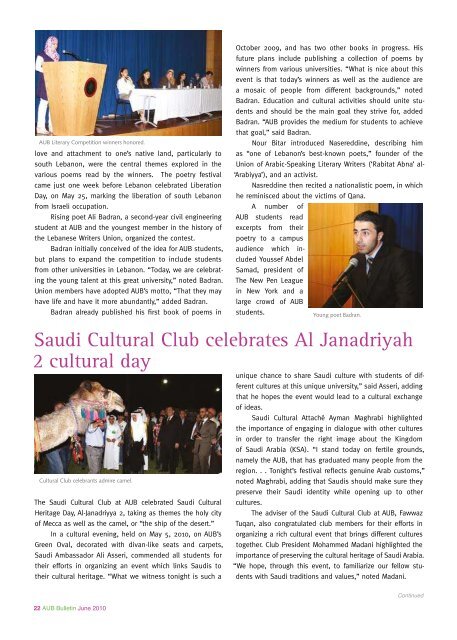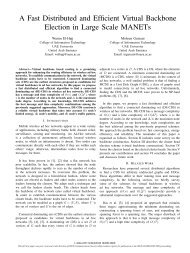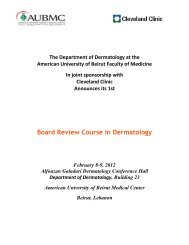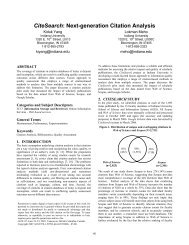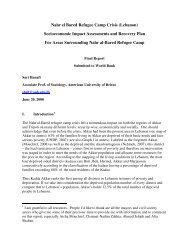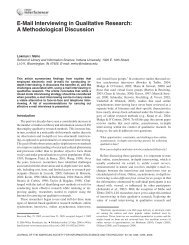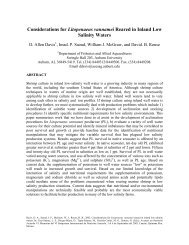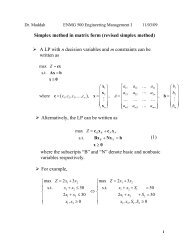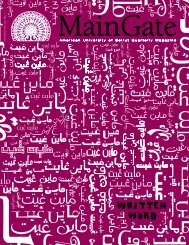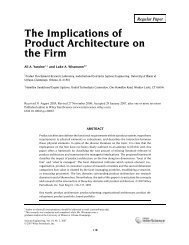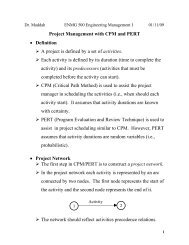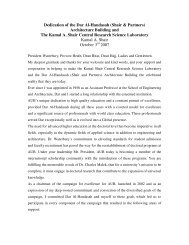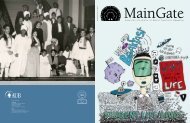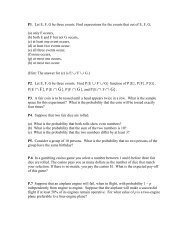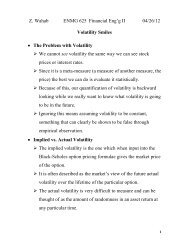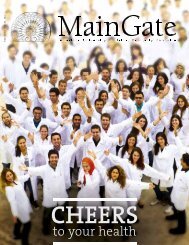Bulletin - American University of Beirut
Bulletin - American University of Beirut
Bulletin - American University of Beirut
You also want an ePaper? Increase the reach of your titles
YUMPU automatically turns print PDFs into web optimized ePapers that Google loves.
AUB Literary Competition winners honored.<br />
love and attachment to one’s native land, particularly to<br />
south Lebanon, were the central themes explored in the<br />
various poems read by the winners. The poetry festival<br />
came just one week before Lebanon celebrated Liberation<br />
Day, on May 25, marking the liberation <strong>of</strong> south Lebanon<br />
from Israeli occupation.<br />
Rising poet Ali Badran, a second-year civil engineering<br />
student at AUB and the youngest member in the history <strong>of</strong><br />
the Lebanese Writers Union, organized the contest.<br />
Badran initially conceived <strong>of</strong> the idea for AUB students,<br />
but plans to expand the competition to include students<br />
from other universities in Lebanon. “Today, we are celebrating<br />
the young talent at this great university,” noted Badran.<br />
Union members have adopted AUB’s motto, “That they may<br />
have life and have it more abundantly,” added Badran.<br />
Badran already published his first book <strong>of</strong> poems in<br />
October 2009, and has two other books in progress. His<br />
future plans include publishing a collection <strong>of</strong> poems by<br />
winners from various universities. “What is nice about this<br />
event is that today’s winners as well as the audience are<br />
a mosaic <strong>of</strong> people from different backgrounds,” noted<br />
Badran. Education and cultural activities should unite students<br />
and should be the main goal they strive for, added<br />
Badran. “AUB provides the medium for students to achieve<br />
that goal,” said Badran.<br />
Nour Bitar introduced Nasereddine, describing him<br />
as “one <strong>of</strong> Lebanon’s best-known poets,” founder <strong>of</strong> the<br />
Union <strong>of</strong> Arabic-Speaking Literary Writers (‘Rabitat Abna’ al-<br />
‘Arabiyya’), and an activist.<br />
Nasreddine then recited a nationalistic poem, in which<br />
he reminisced about the victims <strong>of</strong> Qana.<br />
A number <strong>of</strong><br />
AUB students read<br />
excerpts from their<br />
poetry to a campus<br />
audience which included<br />
Youssef Abdel<br />
Samad, president <strong>of</strong><br />
The New Pen League<br />
in New York and a<br />
large crowd <strong>of</strong> AUB<br />
students.<br />
Saudi Cultural Club celebrates Al Janadriyah<br />
2 cultural day<br />
Cultural Club celebrants admire camel.<br />
The Saudi Cultural Club at AUB celebrated Saudi Cultural<br />
Heritage Day, Al-Janadriyya 2, taking as themes the holy city<br />
<strong>of</strong> Mecca as well as the camel, or “the ship <strong>of</strong> the desert.”<br />
In a cultural evening, held on May 5, 2010, on AUB’s<br />
Green Oval, decorated with divan-like seats and carpets,<br />
Saudi Ambassador Ali Asseri, commended all students for<br />
their efforts in organizing an event which links Saudis to<br />
their cultural heritage. “What we witness tonight is such a<br />
Young poet Badran.<br />
unique chance to share Saudi culture with students <strong>of</strong> different<br />
cultures at this unique university,” said Asseri, adding<br />
that he hopes the event would lead to a cultural exchange<br />
<strong>of</strong> ideas.<br />
Saudi Cultural Attaché Ayman Maghrabi highlighted<br />
the importance <strong>of</strong> engaging in dialogue with other cultures<br />
in order to transfer the right image about the Kingdom<br />
<strong>of</strong> Saudi Arabia (KSA). “I stand today on fertile grounds,<br />
namely the AUB, that has graduated many people from the<br />
region. . . Tonight’s festival reflects genuine Arab customs,”<br />
noted Maghrabi, adding that Saudis should make sure they<br />
preserve their Saudi identity while opening up to other<br />
cultures.<br />
The adviser <strong>of</strong> the Saudi Cultural Club at AUB, Fawwaz<br />
Tuqan, also congratulated club members for their efforts in<br />
organizing a rich cultural event that brings different cultures<br />
together. Club President Mohammed Madani highlighted the<br />
importance <strong>of</strong> preserving the cultural heritage <strong>of</strong> Saudi Arabia.<br />
“We hope, through this event, to familiarize our fellow students<br />
with Saudi traditions and values,” noted Madani.<br />
Continued<br />
As the camel strolled right across the Green Oval, other<br />
traditional Saudi items were on display, including Saudi c<strong>of</strong>fee<br />
pots, incense burners, an old Saudi musical instrumentthe<br />
‘rababa’-which is used by nomads to sing-Bedouin<br />
songs. “It is good to see the Saudi students wearing their<br />
traditional dresses,” commented Asseri on the sidelines. “It<br />
shows how proud they are <strong>of</strong> their native belonging,” he<br />
added.<br />
The cultural evening featured singing <strong>of</strong> traditional<br />
Saudi and Egyptian songs, with oud accompaniment, in addition<br />
to poetry reading by AUB students. Traditional Saudi<br />
c<strong>of</strong>fee and dates were served throughout the event.<br />
AUB students help support education in<br />
public schools<br />
The majority <strong>of</strong> AUB students have had access to some<br />
<strong>of</strong> the best education in the country, sparing them the<br />
experience <strong>of</strong> the local public school system.<br />
International College biology teacher Ghada Fehgali<br />
has worked for over a decade to help improve standards<br />
at public schools.<br />
“Most schools are underfunded and lack the basic tools<br />
<strong>of</strong> education, extracurricular activities, materials, or even<br />
teachers,” explained Feghali, also president <strong>of</strong> the Women’s<br />
Renaissance Group (WRG).<br />
She added that schools do not even have the budget<br />
to run after-school programs for students who are falling<br />
behind in their studies, nor can teachers or administrators<br />
afford to <strong>of</strong>fer the extra help.<br />
The problem became apparent over a decade ago<br />
when the Education Ministry designed a new curriculum for<br />
teaching math and sciences.<br />
Only teachers in the private sector were <strong>of</strong>fered rigorous<br />
training to implement the new curriculum.<br />
Once Feghali and fellow teachers donated time to<br />
teaching public school teachers how to correctly apply the<br />
new curriculum, they realized the dire state that public<br />
schools are in: Teachers are not required to undergo training<br />
beyond two years <strong>of</strong> college, funding is minimal, language<br />
pr<strong>of</strong>iciency and training programs are poor.<br />
Feghali explained that public schools still rely on rote<br />
learning, placing emphasis on memorization and theory<br />
rather than active skills learning and critical thinking.<br />
Coupled with the lack <strong>of</strong> government funding, such<br />
teaching methods produce students who memorize rather<br />
than understand concepts and who are never taught critical<br />
thinking, problem solving, or interpretative skills.<br />
Feghali’s will and love for education led her to knock<br />
on the door <strong>of</strong> Ras <strong>Beirut</strong>’s public schools supervisor to<br />
Cultural exchange between Saudi and Lebanese students<br />
is necessary, noted Madani. “Many <strong>of</strong> our classmates<br />
do not know much about our country, our traditions and our<br />
habits; they simply think <strong>of</strong> us as desert dwellers,” continued<br />
Madani.<br />
Exposing students to diverse cultures is part <strong>of</strong> AUB’s<br />
mission. AUB has long been a hub for students from diverse<br />
cultural, social, and economic backgrounds. It has always<br />
encouraged dialogue and taught cultural tolerance.<br />
“Saudis are desert people,” said Madani, “and we are<br />
proud <strong>of</strong> it.” However, “Saudi Arabia has made significant<br />
strides in the field <strong>of</strong> technology,” he added.<br />
<strong>of</strong>fer the volunteer services<br />
<strong>of</strong> five IC teachers<br />
who will guide the public<br />
school staff on new methodologies<br />
for teaching<br />
math and science.<br />
“The previous year, Students eager to help public schools<br />
the school had a success<br />
pass rate <strong>of</strong> 45 percent, but after we implemented our<br />
program its success rate increased to 100 percent. Upon securing<br />
the approval <strong>of</strong> the Ministry <strong>of</strong> Education, we began<br />
<strong>of</strong>fering programs to other schools,” added Feghali.<br />
As a result, Feghali began a public school educational<br />
program over fifteen years ago, which has evolved since<br />
she joined efforts with AUB.<br />
Now partnered with the Center for Civic Engagement<br />
and Community Service (CCECS), the program has assembled<br />
a pool <strong>of</strong> AUB volunteers from specific disciplines to<br />
provide services for public schools across <strong>Beirut</strong>.<br />
The collaborative will seek new students for volunteer<br />
training at the end <strong>of</strong> every six-week tutoring cycle, entrusting<br />
them with visiting assigned schools to provide basic<br />
tutoring in specific fields such as foreign languages, math,<br />
and sciences.<br />
“I love the experience. The students I tutor love what<br />
they are doing. They are very capable; they just have trouble<br />
expressing their ideas and writing them down. I want to use<br />
my knowledge to help these young students reach their<br />
potential,” said business marketing alumna Reem Koleilat<br />
at the Verdun Public School.<br />
“CCECS has helped tremendously. Together we can<br />
take this further and help make significant and sustainable<br />
changes in Lebanon’s public school systems and, in the<br />
future, in the training <strong>of</strong> teachers within universities across<br />
Continued<br />
22 AUB <strong>Bulletin</strong> June 2010 AUB <strong>Bulletin</strong> June 2010 23


